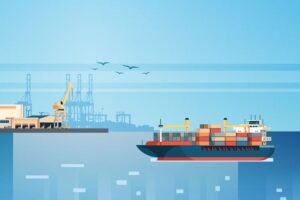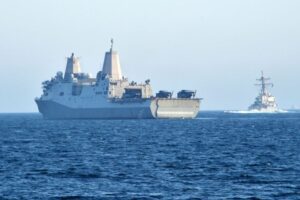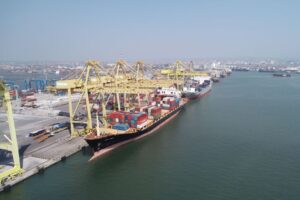What is meant by Maritime Economics?
What is meant by Maritime Economics?
Maritime economics is a term that you may often hear. Generally, maritime economic activities are matters related to maritime affairs.
So what is meant by maritime economy? Referring to Law Number 6 of 1996 concerning Water, the maritime economy is all economic activities that directly or indirectly occur in water areas and activities outside water areas, which utilize natural and environmental resources originating from waters.
Meanwhile in Law no. 27 of 2007, maritime economy is economic activity in coastal areas and small islands. Apart from that, maritime economic activities are activities that produce goods and services for use in waters.
Understanding maritime economics
In simple terms, the maritime economy is all economic activities on the sea coast and areas around the sea. Some maritime economic activities include sea transportation, shipbuilding and maintenance industries, construction and operation of ports and related industries and services.
The maritime economy is different from the maritime economy which is carried out in coastal and ocean areas as well as on land which uses natural resources and marine environmental services to produce goods and services.
Generally, maritime economic activities are carried out by countries that have large oceans or archipelagic countries. One country that implements maritime economic policies is Indonesia.
As an archipelagic country with very wide oceans, Indonesia has great potential to develop a maritime economy.
The aim of maritime economic development is as a manifestation of efforts to equalize national development, in order to realize national ideals.
Examples of maritime economic activities
Some examples of maritime economic activities are as follows:
- Providing inter-island and inter-country ship crossing services
- Marine shipbuilding industry
- Ship repair industry Logistics industry for shipping goods by sea
- Port economic activities
- Sea highway
- Ship navigation services
- Container terminal
- Marine warehousing services
- Weapons and warship manufacturing industry.
Maritime economic sector
In Indonesia, several sectors within the maritime economy are the shipping sector, the fisheries sector and the maritime tourism sector.
1. Shipping sector
As the largest archipelagic country in the world, the shipping industry is the infrastructure and backbone of national and state life. However, the current condition of the national shipping industry is still not optimal in improving the national economy.
Apart from inadequate transport ship facilities, the port system in Indonesia must also continue to be improved. The potential of human resources (HR) in the shipping sector also needs to be increased so that the shipping sector can continue to develop well.
2. Fisheries sector
The potential of Indonesia’s fisheries sector is very large and Indonesia deserves to be the largest fishing industry in Asia. However, the contribution of the fisheries sector to national income is still relatively low.
The increase in aquaculture areas still needs to be encouraged to continue to develop. Moreover, fisheries are one of the mainstay economic sectors in ASEAN countries.
3. Marine tourism sector
It is believed that the development of maritime tourism can have a multiplier effect which can absorb labor, increase people’s income, and attract tourists from abroad (foreign exchange).
Apart from that, the development of maritime tourism has a positive impact on the growth of maritime spirit and culture which can have a multiplier effect in encouraging the realization of a strong maritime country.
However, until now marine tourism has not developed well. Some issues related to marine tourism include the following:
- Low transportation facilities to destinations.
- The number and types of tourism are still few and limited. Poorly improved infrastructure at tourist
- attractions. Security in tourist destination areas is still low.
- Lack of promotions and offers of Indonesian marine tourism.
World maritime axis
The world maritime axis is Indonesia’s new development agenda. To make this happen, the government must at least build strategic maritime forces, ranging from trade fleets to war fleets (navies).
In line with this explanation, the government is indeed trying to build a strategic maritime force. In fact, efforts to make Indonesia the world’s maritime axis is one of the government’s main visions.
Reporting from the official website of the Ministry of Communication and Information, the government’s main programs to make Indonesia the world’s maritime axis are explained, namely:
- Maritime process development from infrastructure, political, socio-cultural, security law and economic aspects.
- Upholding the sovereignty of the Republic of Indonesia’s maritime territory.
- Revitalization of maritime economic sectors.
- Development and strengthening of maritime connectivity.
- Rehabilitation of environmental damage and biodiversity conservation. Increasing the quality and quantity of
- marine human resources.
Furthermore, the government’s efforts to make Indonesia the world maritime axis are summarized in the Five Pillars of the World Maritime Axis put forward by President Joko Widodo. The contents of the five pillars are:
- Rebuilding Indonesian maritime culture.
- Committed to protecting and managing marine resources with a focus on building seafood sovereignty through
- developing the fishing industry by placing fishermen as the main pillar.
- Commitment to encourage the development of maritime infrastructure and connectivity by building sea
- highways, sea ports, logistics and shipping, as well as maritime tourism.
- Maritime diplomacy that invites all Indonesian partners to work together in the maritime sector.
- Building a maritime defense force.
That is an explanation of what maritime economics is and examples. It could be said that the maritime economy is an economic activity that includes sea transportation, the shipbuilding industry and its maintenance, the construction and operation of ports and related industries and services.




